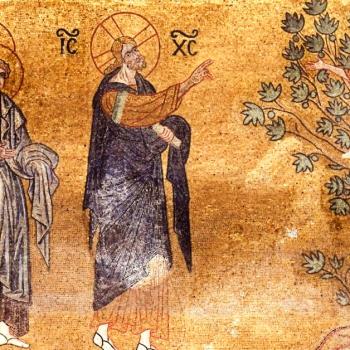And the lectionary wishes us to stop there, focusing our attention on David's confession, fixing in our minds that David was contrite, that he has become a new man, that he is now right with YHWH. A later reader of the Psalms added a superscription to Psalm 51, that wonderful Psalm of penitence, claiming that David had written this poem "after the prophet Nathan came to him, and after he had had sex with Bathsheba." All of this appears to be some sort of conspiracy attempting to make David out to be something he finally is not, namely a changed man, a man riven with the guilt of his foul deeds. The story to follow carries no proof for such a claim.
Nathan immediately forgives David by saying that "YHWH has passed over your sin; you shall not die" (2 Sam. 12:13). But he will not get away scot-free. "Nevertheless, because you have thoroughly scorned the enemies of YHWH, with this action, the son born to you will surely die" (2 Sam. 12:14). This is quite literally what the Hebrew text says; the reason for the death of David's son is that he has scorned "the enemies of YHWH," not YHWH alone as the NRSV has it.
What are we to make of that? Does this terrible curse for David's house remind us of 1 Samuel 25:22, where David vowed that he would kill all of the males of Nabal's house, because Nabal had scorned him? And he would have done it, too, if he had not been stopped by the clever and beautiful wife of Nabal, Abigail. Has David's terrible vow now found its fulfillment against his own house? After all, several of the sons born to David are about to die: Amnon, at the hands of Absalom, his half-brother; Absalom, at the hands of Joab and his soldiers; Adonijah, at the hands of Solomon, his half-brother. The sword never departs from the sad house of David. Even on his deathbed, David unleashes a final instance of his long-distance killing by bidding his son Solomon to murder a helpless old enemy, Shemei, for cursing him on the road of his rejection many years before. That disgusting command is the last thing David ever says (1 Kgs. 2:8-9).
No one who reads this entire story can imagine that David's confession in 2 Samuel 12 of sin is some sort of life-changing experience. Rather it is one more place on the road of a man of deep flaws, one chosen but too often unmindful of the God who made the choice. It is one more example, as if any more were needed, that "what goes around, comes around," and the bad things we do today affect all of our tomorrows in ways we can never quite predict and certainly do not want. It is a lesson learned in the hard way, but it is a lesson, unfortunately, hardly learned at all.





